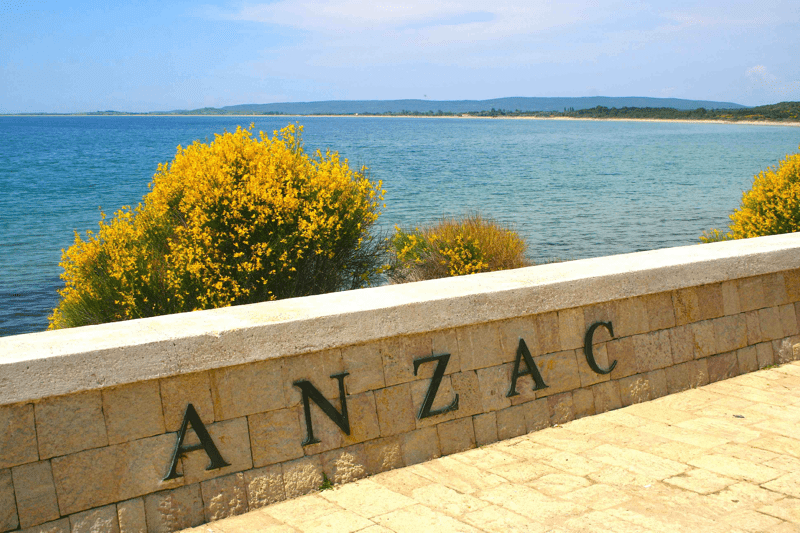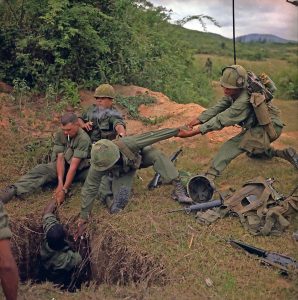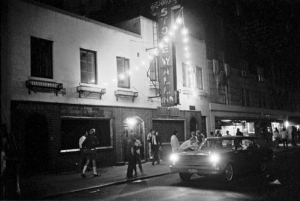
Boats carrying Australian, British, and New Zealand soldiers, advancing towards the shore, were all nervous about what awaited them, gripping their rifles. Captain Richard Willis, commander of C Company said, “It might have been a deserted land we were nearing in our little boats, then crack.”1 There was a door at the front of the boat that opened, and the machine gun fire was insane. Soldiers jumped off the boat fearing for their lives, equipped with their rifles and their 70-pounds worth of equipment. Some of them died instantly, but some made it to shore, only to be cut down by the barbwire that covered the shoreline, Captain Richard Willis described.2

It was war, the Great War, and the British and French troops needed to defeat the Ottoman Empire in order to get access to the Dardanelles straits. Their effort became known as the Gallipoli Campaign. Originally it was only a naval battle. With a fleet of eighteen warships, both British and French navies made an attempt to force their way through the Dardanelles. However, the Ottomans were too strong for them, and the attempt was a failure.3 The reason the Dardanelles were appealing at first was that they believed that it would not require many troops for this operation. How wrong they were. The Gallipoli campaign was conducted by General Sir Ian Hamilton with the plan on the 25th of April, 1915, to land at strategic points across the Gallipoli peninsula, with the ultimate goal of disarming the Ottoman forts at Kilitbahir, enabling the British navy to pass through the Dardanelles.4 The Anzacs were planning to land on Z beach as they were all code worded to S, V, W, X, and Z, all located at different points on the Peninsula. Z beach, located north Kabatepe, was planned to capture Hill 971 and another hill called Maltepe, and then move towards the Dardanelles and reinforce the British troops.5
April 25, 1915, the landing around Ari Burnu on the western side of the Gallipoli Peninsular was a complete mess, with the loss of 5,000 soldiers on the peninsula alone.6 Due to the horrific casualty number, it is now known as the ANZAC cove, in honor of these men. Gallipoli has become a defining moment in history for both Australian and New Zealand soldiers by defining both soldiers’ characteristics: endurance, determination, initiative, and brotherhood. For the Ottomans soldiers, it was the beginning of the decline in their domination of the war.7

The number of deaths in the trenches were diabolical. Over the whole eight months of the Gallipoli campaign, from April 25 to January 9, the allies lost 250,000 people, and the Ottomans lost around the same number. However, the initial landing at Gallipoli tallied up 60,000 people across all beach landings.8 Gallipoli was deemed a total failure overall. With so many casualties and not being able to achieve the objective of getting the naval ships through the Dardanelles, it has gone down in history as a failure of World War I. However, in Australian and New Zealand eyes, they are deemed heroes, going against all odds, fighting out numbered, and given the impossible you could say, for example the Battle of Lone Pine. But they were still able to carry out their duty and have gone down in history as imperishable.9
- Joshua Hammer, “A New View of the Battle of Gallipoli, One of the Bloodiest Conflicts of World War I,” Smithsonian.com, Febuary 01,2015. ↵
- Joshua Hammer, “A New View of the Battle of Gallipoli, One of the Bloodiest Conflicts of World War I,” Smithsonian.com. Febuary 01, 2015. ↵
- “The Anzac Portal,” Why Did Anzacs Land at Gallipoli? | The Anzac Portal ↵
- “Gallipoli: The First Day Centenary Edition,” Gallipoli Campaign, abc.net.au. ↵
- “Gallipoli: The First Day Centenary Edition,” Gallipoli Campaign, abc.net.au. ↵
- Nigal Steel, “What You Need To Know About The Gallipoli Campaign,” Imperial War Museums, June 26, 2018. ↵
- Nigal Steel, “What You Need To Know About The Gallipoli Campaign,” Imperial War Museums, June 26, 2018. ↵
- David Saul, “Time to Put the Record Straight on Gallipoli,” The Telegraph, April 25, 2015. ↵
- David Saul, “Time to Put the Record Straight on Gallipoli,” The Telegraph, April 25, 2015. ↵



36 comments
Aiden Dingle
I remember the first time that I read about the Gallipoli Campaign during high school and the main thing that I could remember about it was how much of a failure it was. I never really understood why so many men were forced to throw away their lives to take Gallipoli. ANZAC was fighting a disadvantageous battle from the start when the battle moved to land, so it’s always confused me about why the military leaders chose to stay and try to take Gallipoli.
Mark Dominguez
Although short, it was a very interesting and informative article. I had never heard about the Gallipoli Campaign; it appears to be a very poorly executed offensive that unfortunately resulted in the loss of many lives. Nonetheless, it is inspiring to see the bravery and dedication to their cause, I’m glad that many of these men are still being honored today. It is nice that the author was able to shed light on such an overlooked and sad event.
Jesus Parker
A terrible offensive to say the least. These men fought an honorable battle and it shows. Even though they were ambushed they were able to battle to the very end despite the odds. It is amazing how they were able to carry out their plans despite all the odds stacked against them. War is terrible and this article exemplifies this statement.
Noah Wesolowski
World War one was a mistake and many young men lost their lives because of it. New and deadly weapons and tactics were used during this war for the first time and the people fighting in it suffered. Gallipoli is another battle in which many men died because of the mistakes of people higher and the need to take the peninsula which is why it is one of the greatest failures of WW1.
Joshua Garza
This is a really interesting article in my opinion. Its sad that this was at the brink of war and people lost their lives but never the less it teaches the reader many things about this certain event in history and one more thing that was going on in the world at this time. This is somewhat a kickoff to the first world war and pave the way for inevitable global destruction.
Mariah Garcia
I really enjoyed this article, and it was definitely something that I had not heard of before. The Gallipoli campaign was definitely an unfortunate ordeal within the Great War and it really lends to the author’s skill as they were able to end the article on such a positive tone. War is ugly, and unfortunately, the men at Gallipoli had to learn this first hand.
Michael Leary
I had learned a bit about the landings at Gallipoli, but the significance never really dawned on me before. It was very tragic how around half a million people died on a landing that was considered to be a military failure. I know that the landings of Gallipoli have affected the Australian fine arts and has found its way into some songs.
Ryan Estes
I never knew of the Gallipoli Campaign until I read this article. I do not know that much about World War I, so maybe that should not come as a surprise. Nonetheless, the thing I found most interesting about this article was the large number of deaths in the trenches. World War I was supposed to be “the war to end all wars.” Unfortunately, many other wars have come after the end of World War I, and the bloodshed has continued.
Alicia Guzman
As an American often times whenever we study military history, especially World War I and II, we specifically focus only on our own perspective. Personally, I think by doing this we miss out on a lot. What this article does it focus on the perspective of Australian, British, and New Zealand soldiers which is fresh. I am glad I have learned about this battle. While they did not come out the winners, they will not be forgotten and the winners do not always have to write the history.
Octaviano Huron
I had never understood how powerful the Ottoman Empire was in the early twentieth century. Obviously, British, French, Australian, and New Zealander armies had underestimated their power, and had paid a devastating price. I found it odd that I was not aware of this war attempt until reading this article. The soldiers that have perished are graciously honored, but this battle should be given more awareness to respect the troops and to exemplify the power of the Ottoman Empire.